

Why university students need a well-rounded education. By the time Atara Messinger finished high school in Ottawa, she had already settled on a career in medicine.
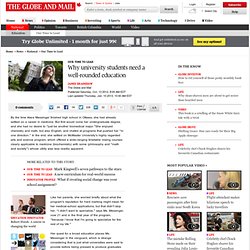
But first would come her undergraduate degree, and she had no desire to “just be another biomedical major.”She enjoyed chemistry and math, but also English, and chafed at programs that pushed her “in one direction.” In the end, she settled on McMaster University’s highly regarded arts and science program, which offered a wide-ranging timetable mixing courses clearly applicable to medicine (biochemistry) with some (philosophy and “math and society”) whose utility was less readily apparent.
Like her parents, she worried briefly about what the program’s reputation for hard marking might mean for her medical-school applications, but that didn’t stop her. “I didn’t want to specialize,” says Ms. Messinger, now 21 and in the final year of the program, “because I know that I’m going to specialize for the rest of my life.” Her quest for a broad education places Ms. 12 Things Kids Want from Their Teachers.
Whether we are a teacher, parent, relative, boss, or community member, each of us has a chance to make a positive and impactful difference in a child’s life.
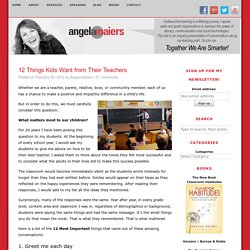
But in order to do this, we must carefully consider this question: What matters most to our children? For 20 years I have been posing this question to my students. At the beginning of every school year, I would ask my students to give me advice on how to be their best teacher. I asked them to think about the times they felt most successful and to consider what the adults in their lives did to make this success possible. The classroom would become immediately silent as the students wrote intensely for longer than they had ever written before.
Why the teen brain is drawn to risk. Teens tend to overestimate risk, research suggests, but process information differently than adults.
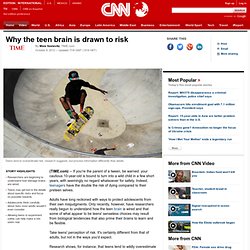
Researchers are beginning to understand how teenage brains are wiredTeens may get lost in the details about specific risks and focus on possible rewardsAdolescents think carefully about risks most adults wouldn't even considerAllowing teens to experiment safely can help make a risk seem real (TIME.com) -- If you're the parent of a tween, be warned: your cautious 10-year-old is bound to turn into a wild child in a few short years, with seemingly no regard whatsoever for safety. Indeed, teenagers have the double the risk of dying compared to their preteen selves. Adults have long reckoned with ways to protect adolescents from their own misjudgments. Take teens' perception of risk. Research shows, for instance, that teens tend to wildly overestimate certain risks -- of things like unprotected sex and drug use -- not to lowball them as one would predict.
Texting while driving: Do you? 10 Jobs That Didn’t Exist 10 Years Ago. Employment trend watchers have been pinpointing the sectors where jobs are anticipated to increase forever—every five years the BLS projects its own outlook and sites like our list what's become old news: that careers in a handful of sectors (most linked to technology, a growing concern about the environment and an aging population) are on the rise while others continue to falter.
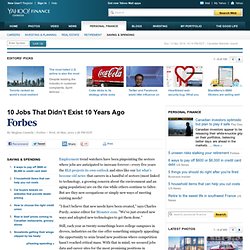
But are they new occupations or simply new ways of meeting existing needs? "I don't believe that new needs have been created," says Charles Purdy, senior editor for Monster.com. "We've just created new ways and adopted new technologies to get them done. " Still, each year as twenty-somethings leave college campuses in droves, industries on the rise offer something uniquely appealing: the opportunity to seize brand new positions where competition hasn't reached critical mass. App Developer The iPhone was introduced in 2007, the Android shortly after. Market Research Data Miner Educational or Admissions Consultants.
To a Beginner, Anything Is Possible. Do We Need Widget Makers or Solution Finders? Increasingly, we see stark evidence that evolving and adapting our educational system is not just about America’s future, but also that of Planet Earth.
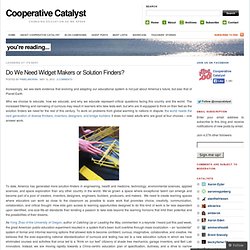
Who we choose to educate, how we educate, and why we educate represent critical questions facing this country and the world. The increased filtering and narrowing of curricula may result in learners who take tests well, but who are ill-equipped to think on their feet as the solution finders we need for the rest of this century. To work on problems from global warming to nations in dispute, the world needs the next generation of diverse thinkers, inventors, designers, and bridge builders. It does not need adults who are good at four choices – one answer work.